Crawling Back: Amazing Spider-Man Annual #3 Review
This annual provides largely strong characterization for Spidey, yet its length prohibits development elsewhere
—by Nathan on November 22, 2025—
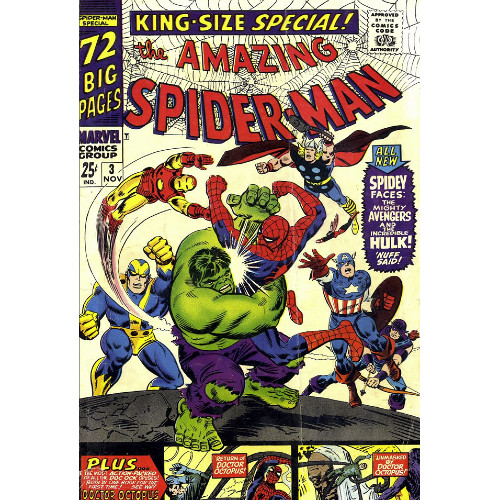
As the brutish verdant gentleman known colloquially as the incredible Hulk popped up in the most recent Amazing Spider-Man issues I reviewed, I thought a trip down the emerald road might be a bit of fun. I wanted to cast myself back into Spidey's earlier years, find one of the first times our wonderful Web-Head stared down the Jade Giant…and lived to either tell the tale or regret he could tell it!
I've already covered their first-ever meeting, Spidey accidentally running into the Hulk while facing both the Enforcers and the Green Goblin. That was a bit of bad luck for our hero, unknowingly seeking refuge in the cave where the fearsome fugitive was hiding. He made it out with all his skin and bones intact, so that's a plus. This time, however, Spidey's intentionally mucking it up with the big guy…never much of a great idea for anyone. Banner's bulky alter ego has been known to rough folks up.
But there's something uniquely at stake in this annual: not a life, nor a city. Reputation, honor, and prestige are tethered to the tracks, and Spidey's gotta untie them before a big green train runs 'em down. Our hero is a hopeful man this issue, staring down the verdant barrel of the Hulk in the hopes of securing a place with that most famed of Marvel heroes.
The Fantastic Four.
Nah, I'm kidding. He's tried that already. In this, Spidey's third-ever annual, our Webbed Wonder seeks membership on a team of another caliber, in a tale our creative team could only call…
"To Become an Avenger!"
Writer: Stan Lee
Pencilers: John Romita and Don Heck
Inker: Mickey Demeo
Colorist: Stan Goldberg
Letterers: Artie Simek and Sam Rosen
Issue: Amazing Spider-Man Annual #3
Issue Publication Date: November 1966
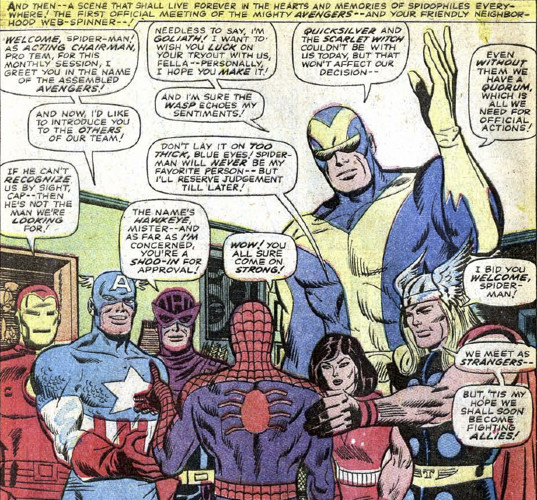
To be clear from the start: this is really a review of a third of an annual, not the whole issue itself. After this initial story are two reprinted ASM issues featuring a two-part Doc Ock tale I hope to review on its own at some point down the line. So let's see what kind of review we can create from part of an issue. Maybe it'll be a third of its usual length!
Which leads into one complaint, that of this story's length. Spidey's first annual was considerably longer than an average issue, his confrontation with the Sinister Six parsed into fun chunks embellished by fantastic splash pages by Steve Ditko. The Web-Head's first team-up in the second annual with Dr. Strange featured a trippy journey through alternate dimensions, and though it was about the same length as a regular issue, it felt well-told. Each annual justified its length, and I would argue "To Become an Avenger!" could have done so were it given the opportunity. It's twenty-one pages, the same length as ASM Annual #2 and about the same page count as a typical issue, but it feels like it could cover more ground.
The Hulk fight, for example, though a fun brawl courtesy of John Romita and Don Heck, is kept to the latter third of the narrative, a mere five or so pages. Sure, Lee and his artists have other things to do, but even if they doubled the space they had, we could have gotten a more diverse, interesting fight.
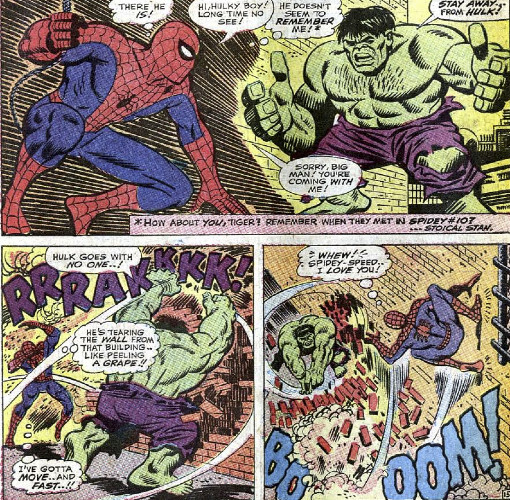
Pacing issues are found elsewhere–a lot of this reads fairly quickly, the reader shuffled from scene to scene. A moment where Peter, having been offered the chance to test himself to join the Avengers, struggles with his own desires against the needs of his ailing aunt passes by in a few panels. Lee brings up an engaging dilemma for the young man–Do I have the right to always think of myself when Aunt May needs me? he asks himself–which does sorta factor into the tale's conclusion, but it's given less weight than it should receive. Lee's theme focuses on an innate character within Peter which guides his actions, and this is a moment which showcases that, but it doesn't feel strong enough.
Likewise, when Peter first meets the Avengers, he quickly lets his temper get the best of him and engages in a brief bout of fisticuffs (which is still about half the length of the Spidey/Hulk fight). Yes, Spidey's exhibited spontaneous emotions before, and you can argue that he's a hot-headed teenager who can act without thinking, but for the story told, it feels incredibly convenient for Lee to just throw in a sudden turn towards anger all so we can see some sparks fly and cast doubt on Spidey's eligibility for being an Avenger. This is a big-time deal for himself and everyone involved. It means the big leagues! Daredevil recommended the guy! For it to all almost fall apart because of some sudden bluster seems like a shaky foundation to craft a story from.
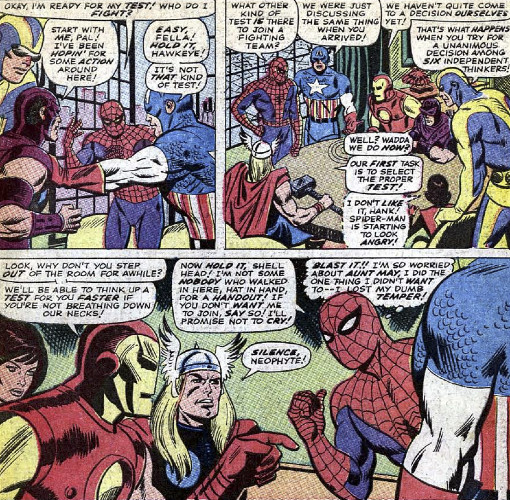
But Spidey's character–for better or ill–is present here, and in other moments, Lee represents him well. The "perpetual loner" bit makes a stronger thematic case, touched on at various points by the writer. Spidey wrestles with whether he wants to join this vaunted team to begin with, juggling the pros and cons decently. He's reasonable in his assessment, even saying Aunt May would be understanding if he joined such an august band of crusaders (and thus avoiding the often-present Lee pitfall of "her frail heart couldn't take the shock!"). You could argue that Spidey joining a team this early in his career would have shaken up the dynamic of his book far too much, and thus the ending (even without the hindsight of decades) is already known before we've begun, but it's cemented in who he is.
Perhaps the most engaging scene, from a character perspective, occurs after Spidey witnesses the Hulk transform into Doctor Bruce Banner. Realizing a man simmers beneath the rampaging brute, our hero understands he can't hog-tie the guy and ship him off to the Avengers. Lee does allow a bit of coincidence to slip in, as the Avengers never directly tell Spidey why they want the Hulk, leaving Spidey to feel a bit of incredulity towards those "august band of crusaders." Should he question them as much as he does? Perhaps not, given their pedigree. At the same time, he's driven by a deeply held sense of responsibility and honor, and the idea of bringing a trussed-up goliath (no, not Hank Pym) to the Avengers like a green Thanksgiving turkey doesn't sit right with him. It's a fair, human assessment he makes, logical and speaking to the kindness with which Spidey operates. Even acting under incomplete information, Spidey showcases a moral compass which guides him–I deliberately fumbled the ball, he tells himself, mournfully. He knows the cost, what his actions prevent him from having, but he also knows what the cost to his conscience would be if he defeated the less-than-Jolly Green Giant.
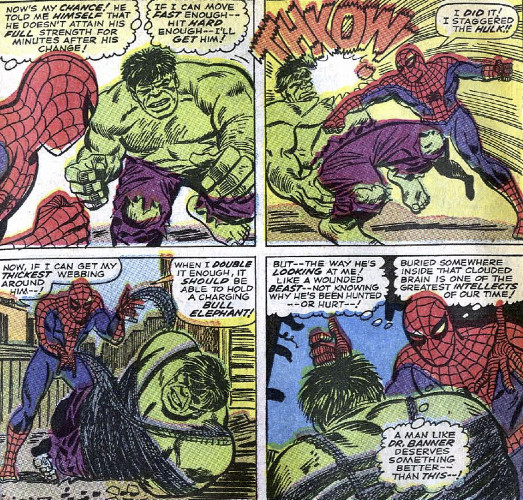
Less interesting is how Lee handles some of his other characters. The Avengers provide a fairly diverse set of opinions on our Web-Spinner, which change a tad as the annual proceeds. Some of these opinions make sense–Hawkeye appreciates Spidey because he, too, understands what it's like being on the wrong side of the law–precisely because they're reflections of those characters. Others are less so. Most perplexing is the Wasp's opinion of our hero, born from the belief that spiders and wasps are natural enemies in nature. Forget the fact they're both humans who dress up as insects; forget even the fact she doesn't have wasp abilities! Yeah, she shrinks, but her whole shtick is founded on being partnered with another bug-based guy. She doesn't have actual powers, unlike the guy who was bitten by a radioactive spider. There's no reason for there to be any animosity, but Lee tries to make it a bit of tension. It doesn't make sense, and therefore doesn't work for me.
What this annual should stir in the reader–and where I believe it genuinely succeeds–is a sense of longing, of "What if-?" What if Spidey was a part of a prestigious super-team? How would his life be different, better? Even someone like Jonah Jameson would have to treat me with respect, Peter thinks as he lets himself daydream a little. The promise Lee, Romita, and Heck dangle before the audience is tantalizing: a Spider-Man, no longer alone. Peter, with the extra support he'd need. Yes, the tone of Spidey's solo title would have become drastically different, I'd argue, giving him a greater helping of hope than he's generally allowed. You know it isn't going to happen–and wouldn't for another thirty-nine years (not counting a few other attempts in-between)–but the concept of it is, even momentarily, refreshing to read.
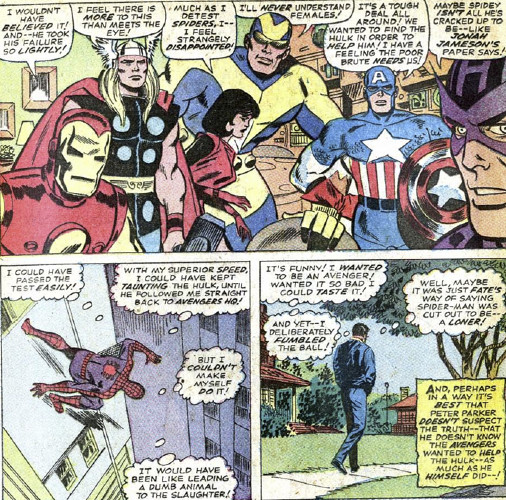
Story-wise, the first third of this annual provides a bit of a divided tale, split between some engaging character moments, specifically on the part of our hero, and some loony takes on characters. The length hampers it from really leaning into some of the themes Lee's trying to get at, specifically Spidey's varying emotions of the team and some of his more immature reactions. Peter is delivered as a well-rounded individual, at times thoughtful and considerate, other times a tad arrogant. I don't mind the negative emotions; I just wish they were teased a bit more in the tale itself. Other characters aren't as well-regarded–I'll never understand the animosity from Janet van Dyne–but I guess we're not here for them. "To Become an Avenger!" does show what Spidey would need to do to become an Avenger, a price, to him, not yet worth paying. I wish it were longer, I wish some of themes were given a better chance to breathe, but even in twenty-one pages, we are provided a glimpse of what Spidey's world could have become if circumstances swung a little different.
And maybe a glimpse, in 1966, was all readers needed.